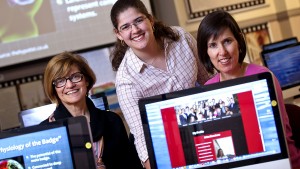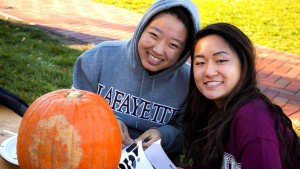Setting Goals to Do Better
As we near the end of the semester, students may be thinking about things that they want to improve and new challenges they would like to tackle. You can help your student form some of these “wants” and “needs” into tangible goals. For instance:
-

Professor Michelle Geoffrion-Vinci and Professor Mary Toulouse go over a presentation with Amanda Furtado Sampaio ’16 in the Language Research Center.
When students say, “I’d like to do better in school,” what does that mean? Are they committing to a certain amount of study time each day? Have they gone to the ATTIC for a session on study skills? Do they want to challenge themselves to try a new type of class? Will they make more of a point to talk with professors when they don’t understand something? Help your student list some measurable, realistic goals so he or she really can improve on academic performance.
- When students say, “I want to be smarter with my time,” what do they mean? Do they want to learn more about effective time management skills? Have they gone to the ATTIC for one of the sessions on time management? Are they going to make a concerted effort to spend less time in front of a TV or on social media? Encourage your student to explore what this really means, what resources are on campus and to put some ideas into action.
-

Students had some fall fun carving pumpkins on the Quad. The picnic was hosted by the Environmental Science and Studies programs and featured produce grown at LaFarm.
When students say, “I need to meet new people,” what are they looking for? Are their current friends not meeting their needs? Do they need to expand their friend-base? Are they looking for people who will challenge them positively? Help your student determine why this is a need so he or she can figure out the best places to seek new acquaintances.
Setting goals is often a personal matter. Yet bouncing around ideas and exploring options with your student can help lead to effective goal-setting behavior and can be the start to a happy, productive college experience.